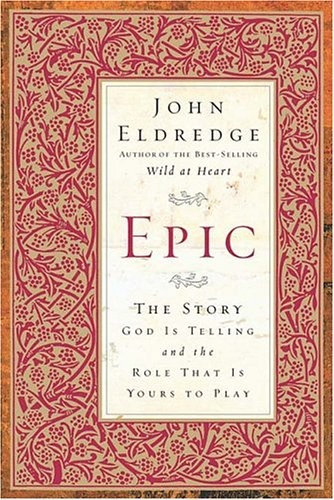Bible 101
I’m taking a break from From God To Us. It’s full of knowledge I want, but it’s a little dry. I’m about halfway through it, and I’m going to set it aside for awhile and read something more dramatic. I’ll return and finish it, I just need a break. Here are some questions and unfinished thoughts at the halfway point.
Authority:
I have a name now for the views of C.S. Lewis as expressed in Reflections on the Psalms:
[The Bible] is not ‘the Word of God’ in the sense that every passage, in itself, gives impeccable science or history. It carries the Word of God; and we (under grace, with attention to tradition and to interpreters wiser than ourselves, and with the use of such intelligence and learning as we may have) receive that word from it not by using it as an encyclopedia or an encyclical but by steeping ourselves in its tone or temper and so learning its overall message.
He goes on to say that the flawed human perspectives through which the Bible is written don’t leave us with something we can memorize and rely on “like the multiplication table.”
I think the name for that school of thought is modernist. From God to Us lists three different perspectives on the Bible’s authority, from orthodox (the Bible IS God’s word) to modernist (the Bible CONTAINS God’s word) to neo-orthodox (the Bible BECOMES God’s word). Lewis’s thoughts sound modernist, a view which (in the words of Geisler and Nix) holds that “the Bible is a victim of its times like any other book… that many of its legends, myths, and false beliefs about science were incorporated into the Bible.” Modernists see parts of the Bible as divine and true (inspired, presumably), and other parts, not so.
How to read:
Like Lewis suggests, reading the books of the Bible involves reading them in the right sense, the sense in which they were intended, and not trying to wrestle them all into encyclopedias or textbooks of science or history. So this opens it up to the charge, “How do you decide?” I would agree with Lewis on this: we read “under grace, with attention to tradition and to interpreters wiser than ourselves, and with the use of such intelligence and learning as we may have.” Lots of books are difficult to read, but this doesn’t give us license either to oversimplify them, or dismiss them. The Bible takes some work to read well. One of the distinctive things about Jesus’ teaching is that he interprets the Scriptures as they were intended — “with authority,” as many of his listeners marveled.
Consistency:
It’s been interesting to realize how much faith in people goes along with having faith in the Bible. In the process of canonization people long before my time have already decided to get rid of books that are inconsistent or inaccurate. These aren’t the only criteria for what belongs to the Bible, but they’re still judgments that have been made by others.
It’s always been stressed to me that there is a marvelous consistency between the 66 books, even though they were written by different people in different ages. The skeptic would say, “Of course it’s consistent. Anything inconsistent has been rejected by its compilers.” But though this emphasizes the consistency/unity of the books now included, it doesn’t invent it; it doesn’t take away from its remarkableness. It’s still quite uncanny.
Inerrancy:
It’s interesting that inerrancy (of the autographs only) is a doctrine that’s implied, not explicitly claimed, in Scripture. “If the Bible is not correct on factual and empirical matters,” Geisler and Nix write, “then how could it be trusted in spiritual matters which are not subject to such tests?” I hesitate at that logic. Is it right to place such emphasis on something merely implied — something our logic demands? Isn’t that, possibly, trusting in human rationality rather than God’s word? My master’s thesis was on a writer named Frank Norris, who insisted that truth and accuracy are two different things. Is that applicable here?
In the end, it boils down to faith — not as a substitute for reason, but as an acknowledgment of its limits. Even where the original manuscripts have never been found, write these authors, “The answer is that inerrancy is not an empirically known fact but a belief based on the teaching of the Bible about its own inspiration.” So the real question is whether the worldview and teaching of the Bible are worthy of such a faith.
I believe it is. It’s because having read the Bible, I’ve been convinced. It’s truth claims for me lie in its level of understanding and wisdom and revelation and gritty realism. I’m convinced, too, by its grand, amazing story of redemption, which is anticipated in other myths and writings but culminates here in a totally unique way that no one — not even those who knew the law and the prophets best — ever expected.
This morning I read the words of Jesus in Matthew 5:17-20, at once a firm endorsement the authority of Scripture and a reminder that it’s in the life, not the intellectual debates, where the truth is either confirmed or denied:
17“Do not think that I have come to abolish the Law or the Prophets; I have not come to abolish them but to fulfill them. 18I tell you the truth, until heaven and earth disappear, not the smallest letter, not the least stroke of a pen, will by any means disappear from the Law until everything is accomplished. 19Anyone who breaks one of the least of these commandments and teaches others to do the same will be called least in the kingdom of heaven, but whoever practices and teaches these commands will be called great in the kingdom of heaven. 20For I tell you that unless your righteousness surpasses that of the Pharisees and the teachers of the law, you will certainly not enter the kingdom of heaven.
Once I’ve committed myself to believing and following Jesus, it becomes impossible to take a casual or noncommittal attitude toward the Bible as God’s Word. He affirms it here, right down to “the least stroke of a pen.”


